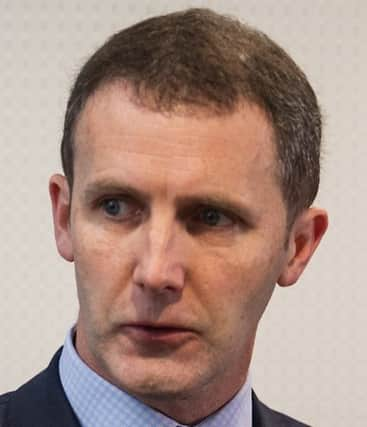Michael Matheson announces new strategy to cut prison population


Justice Secretary Michael Matheson unveiled a new Scottish Government strategy to deal with a “stubbornly high” prison population by focussing more cash on reducing crime.
The launch of the Scottish Government’s “Vision and Priorities for Justice” report came as work to demolish Scotland’s only female prison – Cornton Vale, near Stirling - began.
Advertisement
Hide AdAdvertisement
Hide AdThe controversial jail is to be replaced by a smaller 80 capacity prison on the site plus five new units known as Community-based Custody Units (CCU) for up to 20 women located across the country.
Mr Matheson announced that the first two CCU covering the west and east of the country are to be based in Glasgow and either Dundee or Fife.
The idea is that female offenders will be housed closer to their families and will be given targeted support to help them address problems such as alcohol, drugs, mental illness or domestic abuse.
The initiative is a key part of an overall strategy to prevent crime and undertake early intervention in an attempt to keep people out of prison when possible.
The report said Scotland had 138 prisoners per 100,000 population, a figure just behind that in England and Wales but more than recorded elsewhere in western Europe including Portugal, Spain, France, Belgium, Austria, Italy and Switzerland.
Although crime appeared to be falling more quickly in Scotland than in other Western societies, the prison population “remains stubbornly high”.
The report further noted that international evidence suggested that prison “can have damaging effects through weakening social ties, creating stigma, adversely impacting on employability and housing stability, ultimately increasing the likelihood of reoffending”.
It added that short sentences were “counter-productive” because they do not prevent reoffending.
Advertisement
Hide AdAdvertisement
Hide Ad“Over half of those released from a prison sentence of 6 months or less are reconvicted within a year, and over two-thirds of those who are reconvicted end up back in prison. For some people, prison continues to be a revolving door,” the report said.
One of the report’s key priorities was that: “We will use prison only where necessary to address offending or to protect public safety, focusing on recovery and reintegration.”
Currently, the “cost of enforcement” outweighs the proportion of the Scottish Government’s £2.5 billion justice budget spent on prevention and early intervention.
The report said: “In times of reduced public spending, a shift towards preventative spending is challenging, but it is more likely to be effective in the long term.”
Mr Matheson said: “While our imprisonment rate – the second highest in western Europe – remains too high, prisons will always be necessary for those who commit the most serious offences, or who pose significant risks to public safety.
“The Scottish Prison Service is transforming how they work to better rehabilitate those in custody, addressing underlying issues that can often drive their return to jail. With the demolition of Cornton Vale under way, there is no turning back on our plans for a smarter, more progressive approach to managing women in custody, ensuring they are prepared for life after release.
“That is why I am also pleased to announce that the first two community custodial units for west and east Scotland will be in Glasgow and in Fife or Dundee. By housing women in smaller, community-based units closer to their families, and providing additional support to address their needs, such as drug and alcohol advice or mental health support, we can further reduce re-offending – and so keep crime down and our communities safe.”
The Scottish Government said it would work to improve health and well-being in prisons, focussing on substance abuse and mental health.
It intends to promote rehabilitation and to identify offenders quickly.